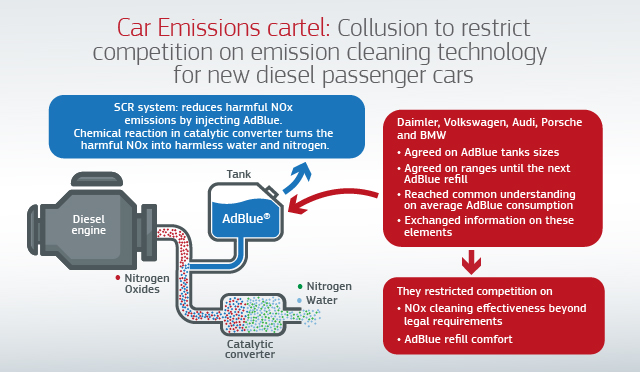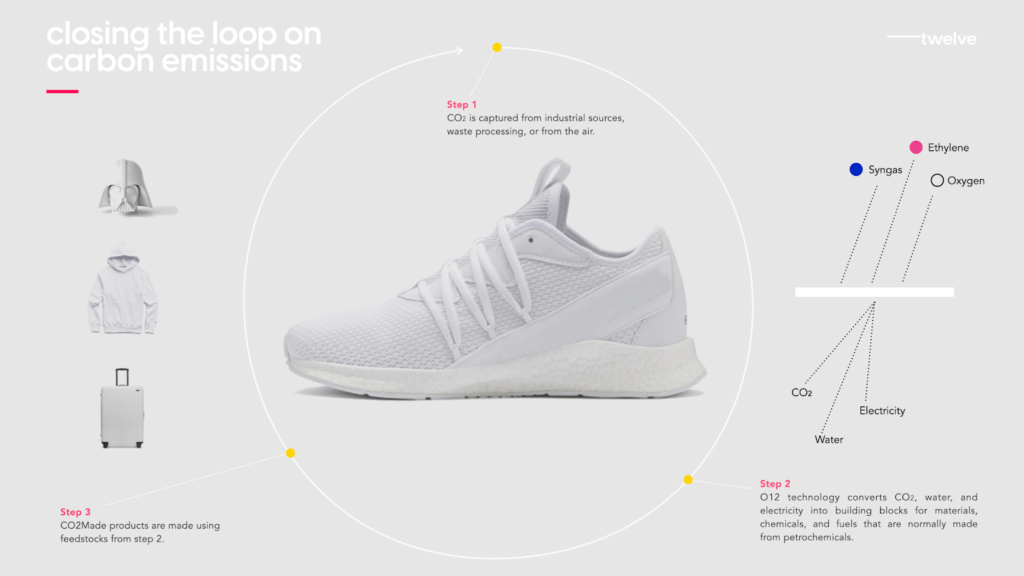
Happy Tuesday. We’ve become a bit addicted to sustainable seaweed startups this week. We’ve been advised to see kelp.
In today’s edition:
📈 ESG commitments already breaking records
🚜 A “sea-combine” helping to grow seaweed farming
💰 NFT’s – an unlikely approach to charitable fundraising

German Carmakers Fined $1 Billion For Conspiring To Hold Back Green Emissions Tech
Frequent readers will know we are big advocates of pre-competitive collaboration for sustainable goals… but this week we saw its dark side. The European Commission fined German auto manufacturers (Daimler, BMW, Volkswagen, Audi and Porsche) roughly $1 billion for collaborating to slow the development of green emissions tech (See below).
A landmark move: It’s the first time anti-trust laws have been deployed for the slowing of technological development. It highlights the importance of clear government guidelines for POSITIVE cooperation on research and development. Existing guidelines date from 2011 and aren’t apt for the complex challenges the automotive industry faces.

A record breaking year for ESG … already
We’re halfway through 2021, and records are being broken in sustainability metrics left, right and centre. Corporations making Science-Based Targets commitments, i.e. those made in conjunction with Paris Agreement targets, have already set an annual record (150 in June alone means 590 companies have now aligned their emissions trajectory with the global agreement). Green bonds (which finance sustainability projects) have also surpassed their 2020 total with $248 billion issued.
BlackRock secures $250million for climate projects
The world’s largest investor has just secured $250 million from global investors and governments for the Climate Finance Partnership (CFP). The CFP is a flagship finance vehicle which invests in renewable-energy solutions (like renewable power generation, energy storage and ultra-low transportation) across emerging markets – such as Asia, Latin America and Africa.
The ultimate aim: of CFP is to raise $1 billion to finance renewable projects and support the $1trillion needing to be invested in clean energy in developing economies by 2030 to deliver a net-zero world.
🤖 Future of Tech (1-minute read)
The startup helping Mercedes closing the carbon-emission loop
Capturing CO2 from the atmosphere and turning it into useful materials is called carbon utilisation – a process that, according to Vox, could be a trillion-dollar industry by 2030. US startup, Twelve, does exactly this by using electrolysis technology to transform CO2 into products like foam for trainers (how does it work) replacing the need for petrochemicals conventionally made from fossil fuels. Twelve’s current customers include Mercedes-Benz, Procter & Gamble and NASA, and they’ve just raised $57 million to profitably scale.
Serious potential: If deployed at scale, Twelve’s tech has the CO2-reducing power as 120billion trees.

The ‘sea tractor’ helping harvest seaweed in deep ocean
Seaweed farming is talk of the town due to seaweed’s ability to rapidly absorb carbon dioxide (growing at 2 ft per day). Seaweed can also be used to make climate-friendly products, from sustainable fish feed to biofuels and bioplastics.
A challenge… Scale. Current farming methods are labour intensive (making it expensive) and largely restricted to shallow waters. All of this makes it a challenge for seaweed products to compete on price with their traditional substitutes.
Enter… Sea6 Energy, the India-based start-up has designed the “Seacombine,” a tractor-like machine which autonomously harvests and replants seaweed in deep water off the coast of Indonesia. This system is designed to help the seaweed industry scale up, and capture seaweed’s potential to help fight climate change.
💡Start-up Spotlight (1-minute read)
Non-Fungible Token: Allow you to buy, sell and certify ownership of unique digital items (anything from artwork to famous images) and keep track of who owns them using the blockchain.
More charities are looking for new ways for people to donate and have turned to Non-fungible tokens, with astronomical sums of cryptocurrency being paid for intangible artwork (handy explanation here).
Notable Examples:
- Twitter CEO, Jack Dorsey’s first tweet sold as an NFT for $2.9 million, which he donated to GiveDirectly, supporting people affected by COVID-19 living in extreme poverty in Africa and the US.
- Artist, Beeple, raised $6 million by auctioning his piece Ocean Front (See below), raising $6 million for the Open Earth Foundation to combat climate change.
Why? NFT’s allow organisations to raise funds in a transparent way, and generate additional value from their ambassadors. All this, while engaging a new audience and strengthening brand awareness.
The green lens: There is concern over the environmental credentials of NFT’s, as making, buying, or selling an NFT relies on energy intensive processes. When Edward Snowden, American whistleblower, auctioned off his NFT he earmarked part of the funds to offset carbon emissions from the transaction.

💭 Little Bytes
Quote: “As our lives become increasingly reliant on digital technology, we have become oversaturated with information… I think finding a way to coexist with technology in a way that benefits us but does not consume our lives, is perhaps one of the greatest challenges of this digital era.” CTO, Cisco AppDynamics, Gregg Ostrowski
Stat: 50% of shoppers think about sustainability when they buy food – study by food corporation, Kerry
Watch: Volunteers in Estonia restore the landscape to fight climate change
🗞 In other news…
Tate & Lyle teams-up with Earthwatch on stevia sustainability
- Engine No. 1 the activist hedge fund who secured three board seats at Exxon Mobil, have now launched a fund to drive systemic change in 500 US companies
- Rotterdam release plans for a circular city
- Research paper (controversially) concludes that cutting meat from diets won’t reduce a person’s carbon footprint much
🎣 Gone Phishing
Three of these stories are true, one we made up, can you guess which?




